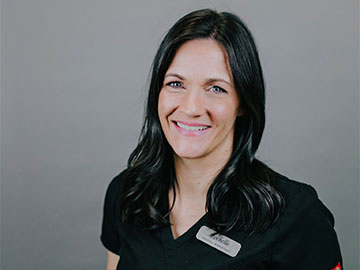

Written and reported by:
Lisa Jaffe
Contributing Writer
It’s a new year, and you may be ready for a new chapter in your allied health career. Leveling up your education could be your first step toward the promotion you’ve wanted—or an entirely new profession.
There are many education pathways to get where you want to go. You could choose an online program or a hybrid program to move from an associate degree to a bachelor’s degree. You could go to school full time or continue to work and study part time.
The payoffs of continuing your education can be significant—greater passion for your work, reaching your true potential, and a higher salary.
Here are some examples to get ideas flowing on how you can move ahead in an all allied health career.
Healthcare Assistant Manager to Healthcare Administrator
Healthcare administrators work in hospitals and healthcare practices to oversee the smooth operations of a single department or an entire facility to ensure that providers, patients, and staff all have what they need to deliver quality care.
Education You’ll Need: To land an entry-level position, you’ll need a bachelor’s degree. In larger practices, clinics, and hospitals, and in larger cities, many healthcare administrators have master’s degrees.
What You’ll Be Prepared to Do: Depending on where you work, you may oversee a facility department or a larger area, managing operations, staff, policy decisions, and care of patients.
Curriculum: Core coursework for a bachelor’s in health administration will include classes such as human resources, the economics of healthcare, healthcare accounting, health law, and healthcare ethics.
Clinicals/Training: Some programs require an internship or capstone project, in which you work with a mentor to solve a problem or create a program, and then present your results.
Time to Complete: If you already have an associate degree in healthcare, you can generally finish a bachelor’s in two years if you attend full time. But some programs may take less time, especially if you already have experience in your field.
Potential Salary: Healthcare managers and administrators fall into the same category of occupations as defined by the U.S. Bureau of Labor Statistics, with a wide salary range to match. The median annual salary is $110,680. It’s hard to know precisely where a given healthcare administrator’s salary will fall but expect it to be higher than an assistant manager’s salary.
When researching programs, you should find the best program for your finances and the time you’ll be able to devote to school, says Aimee Shapiro, MSW, LICSW, who leveled up her education from massage therapist to social worker and therapist.

She could have simply hung up a shingle that said “counselor,” but to be reimbursed by insurance companies, she needed a license, which requires a specific educational credential. It didn’t hurt that with more education, she can also earn more money.
“Take the best program you can that works for you financially, personally, and in terms of time,” she says. “Go where something there calls to you.”
Health Information Specialist to Information Manager
Education You’ll Need: If you’re an information specialist or technician, you likely have an associate degree. But if you want to go from technician to information manager in this in-demand field, you’ll need to level up to a bachelor’s degree.
What You’ll Be Prepared to Do: Oversee the health information systems in your clinic, a hospital department, or another healthcare facility; ensure government and professional ethics, guidelines, and laws are met; manage the creation of reports and data for healthcare staff and administrators.
Curriculum: Expect courses in health information systems and management, health data analytics, healthcare policy, legal concepts and ethics for health fields, and clinical documentation.
Clinicals/Training: Some programs require work experience, internships, or capstone projects.
Time to Complete: A lot depends on how many credits you’ll be able to apply from your associate degree toward your bachelor’s degree. Generally, it takes two years of full-time study to move from an associate to a bachelor’s degree.
Potential Salary: According to the BLS, health information specialists earn a median annual salary of $62,990, compared to $110,680 for health information managers.
Dental Assistant to Dental Hygienist
Education You’ll Need: Despite similar names, these jobs are quite different. A dental assistant works with patients but also does administrative work that helps a dental practice run smoothly. A dental hygienist focuses on dental work, particularly cleaning teeth. To become a hygienist, you’ll need to earn an associate or bachelor’s degree.
What You’ll Be Prepared to Do: Conduct mouth exams, clean patients’ teeth, assist in other dental procedures, and ensure that dental equipment is clean, sterilized, and ready for use.
Curriculum: Your coursework will cover biomedical science, dental science, and dental hygiene science. Broken down further, you can expect classes such as anatomy, chemistry, tooth morphology, oral health education.
Clinicals/Training: You’ll complete supervised clinical training over the course of your program: 8-12 hours of hands-on practice per week in your first year and 12-16 hours in your second year.
Time to Complete: An associate program generally takes two years full time, while a bachelor’s takes four years.
Potential Salary: Be prepared for a salary leap if you pursue a dental hygienist career. The BLS says dental assistants earn a median annual salary of $46,540, while dental hygienists earn $87,530. This is just one of the top reasons to consider dental hygiene.
Medical Administrative Assistant to Medical Services Manager
Education You’ll Need: A bachelor’s degree is generally required for a medical services manager position, which can include several types of jobs. For instance, you may work with financial systems as a billing manager, or you could be a compliance manager, ensuring that your organization meets government rules and regulations.
What You’ll Be Prepared to Do: It all depends on your focus. For instance, if you’re a billing manager, you’ll oversee billing and coding processes, help providers and medical coders understand new coding regulations, and navigate the regulations and rules of the overall healthcare system as they relate to billing and coding.
Curriculum: You’ll most likely earn a bachelor’s degree in business administration, accounting, or healthcare administration with coursework in business management, accounting, and health ethics and law.
Clinicals/Training: Many programs require internships or capstone projects that can take you outside the classroom and provide valuable experience in a healthcare setting.
Time to Complete: Most bachelor’s degrees take four years to complete if you study full time. If you’re a medical administrative assistant with an associate degree, you could be part of the way there because you may be able to apply credits from that degree to a bachelor’s.
Potential Salary: More education will pay off if you take this route. The BLS says medical assistants earn a median annual salary of $42,000, compared with $110,680 for a medical services manager. That’s quite a leap, so it’s important to note that even the lowest 10% of medical services managers make more than the median middle for medical assistants: $67,900.
Certified Nursing Assistant to Licensed Practical Nurse
Education You’ll Need: If you are interested in moving beyond the entry-level patient care provided by a certified nursing assistant (CNA), your next step is to become a licensed practical nurse (LPN). This requires graduating from an LPN program and earning a license.
What You’ll Be Prepared to Do: Provide routine patient care, including taking patient vital signs, recording patient histories, administering medication, providing immunizations, and caring for wounds and injuries.
Curriculum: You’ll take courses in biology, anatomy, chemistry, nursing, and emergency medical technology.
Clinicals/Training: Clinical training is a large part of an LPN’s education, and you can expect hands-on clinical experience in a medical setting.
Time to Complete: LPN programs generally take 12 to 18 months.
Potential Salary: While CNAs earn a median annual of about $38,200, LPNs earn substantially more—$59,730 a year, according to the BLS.
Medical Assistant to Physician Assistant
Physician assistants (PAs) are licensed healthcare providers that can practice medicine under the supervision of a physician.
Education You’ll Need: Most PAs need a master’s level degree from an accredited PA program. These programs typically require you to already have a bachelor’s degree and certain course prerequisites in order to apply. If you don’t already have a bachelor’s degree as a medical assistant, you may need to upgrade to one.
What You’ll Be Prepared to Do: After completing a PA program, you’ll be prepared to diagnose and treat patients with a variety of ailments, from preventative to emergency care. You will be ready to take the Physician Assistant National Certifying Examination (PANCE), which is needed to obtain a license to practice.
Curriculum: PA programs teach students topics in advanced medical knowledge, patient care and education, interpersonal skills, medical systems, health policy, ethics and more.
Clinicals/Training: Every program varies in the number of clinical hours needed to be admitted as well as how many you will complete during the program. It is common for programs to require at least 1,000 hours of clinical training to be admitted, and you can expect to complete another 2,000 hours for your degree.
Time to Complete: Most PA programs take approximately two to three years to complete on top of a bachelor’s degree typically needed to enter into a program.
Potential Salary: The BLS currently states that the median annual salary for physician assistants is $130,020. This is more than three times the median annual salary of medical assistants which is $42,000.
Certifications
Another way to advance your education is with professional certifications. These credentials are awarded to professionals whose knowledge and expertise go beyond what they learned in school. A certification can be a mark of distinction that tells others that you’re committed to your field.
Some allied professions require certification to practice. But other certifications are optional, and these can expand your skills and open doors to advancement or other career opportunities.
For example, a radiology technologist must earn a basic certification to perform X-rays. But they also can earn many optional certifications to build on their skills and qualify for imaging procedures beyond X-rays, such as:

Gina Piccirilli, CPC, CPB, CPMA, a physician billing and coding educator in New York, is currently going for her fourth certification. For her, it’s about following a passion to “become the complete billing and coding guru.”
She recommends aiming for a new certification every 18 months or so. “It makes you more well-rounded,” Piccirilli says.
Even if an extra certification doesn’t win you the job you want, prospective employers will likely take note, and you could be a top candidate when another position opens.
You may also enjoy:



